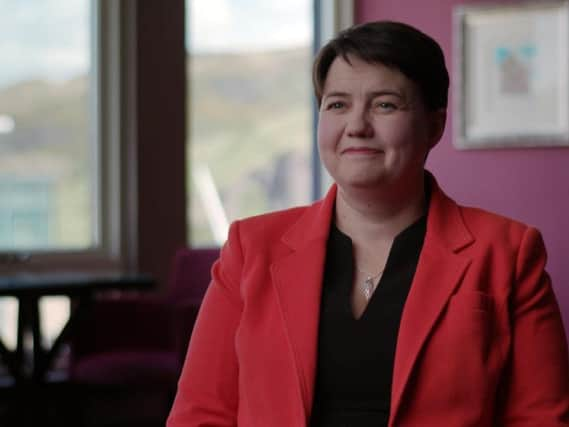Ruth Davidson admits to "panic" when polls shifted to Yes in indyref


And Ruth Davidson also admits that she did not want the No campaign to focus on more devolution for Holyrood.
In the last programme of a three-part BBC Scotland documentary on the 2014 vote, Ms Davidson says the decision to cancel Prime Minister’s Questions and have David Cameron, Nick Clegg and Ed Milliband come to Scotland smacked of “panic”.
Advertisement
Hide AdAdvertisement
Hide AdShe is also clear that she did not support the change in campaign tactics to offer more powers to the Scottish Parliament.
However the then Chancellor George Osborne says “something dramatic” had to be done to impress upon voters the seriousness of the choice Scotland was facing.
The politicians were responding to a private poll which put the Yes campaign four points ahead, and a Sunday Times poll which also had the pro-independence group take the lead for the first time just two weeks before the vote.
In the programme Ruth Davidson says: “My recollection of when the Yougov poll came out was overwhelming panic among the people around the Better Together campaign.
“I just kept saying people need to hold their f-ing nerve.”
However George Osborne believed that a “concrete offer” of more powers had to be made if the No campaign was to win - and he would announce it on the Andrew Marr show.
He says: “It was a big shock. We needed to stop the news being about the opinion poll, so we would offer faster, safer, better change.
“I told her [Ruth Davidson] this is where we’ve got to, this is what we’re going to do. People like Ruth were saying don’t suddenly change things around but we were thinking what small adjustments could we make?”
He adds: “We needed to tell people this is a really big decision. Cancelling PMQs and other devices like that were required to dramatise how big a decision this was.”
Advertisement
Hide AdAdvertisement
Hide AdMs Davidson says there was a “frank exchange” of views. She also says she was “not a fan of the idea of the PM, Nick Clegg and Ed Miliband all deciding at the last minute they were going to chuck PMQs and dash to Scotland.
“It was a gimmick. It seemed like panic had set in and would look to the public that panic had set in. What was David Cameron going to do? He wasn’t going to start knocking doors in Shettleston and everybody knew it.”
The programme also highlights the day when 100 Labour MPs arrived at Glasgow’s Central Station to be confronted with a Yes campaigner playing the Darth Vader march from Star Wars.
Jim Murphy admits it was “absolutely brilliant”. But he adds: “The idea of saying please don’t go, of MPs from Liverpool, Manchester, Swansea and Cardiff saying this is about social solidarity, don’t go, I thought that was an important argument.”
Covering the Daily Record’s Vow, Gordon Brown’s last minute entry to the No campaign and referendum day itself, the programme also details the breakdown in trust between some independence supporters and the BBC after presenter Nick Robinson quizzed Alex Salmond about RBS potentially moving its HQ from Edinburgh to London.
Robinson says: “Very early on I asked if I was covering this campaign because if I am I need to win the trust of people involved. They didn’t quite listen to the warning that if I was sent at the last minute, that if I could be presented as the guy in a suit from Westminster, the Englishman from the British Broadcasting Corporation, that would be tricky.”
Recalling the press conference where he asked about RBS, and in his report said Alex Salmond “didn’t answer”, he says: “Looking back, even the addition of the the word “really” would have made it better because it was a subjective view as to whether he did or didn’t properly answer the question, which is up to viewers to decide.
“It wasn’t a clever line and given the chance I would have rewritten it.”
Advertisement
Hide AdAdvertisement
Hide AdThe fallout from that interview was a protest outside BBC headquarters in Glasgow, demanding Robinson be sacked.
Robinson says: “Several thousand people were amassed behind a banner describing me as a liar... I’m laughing now but it was a really unpleasant experience.”
The series ends on the decision by David Cameron to announce his plans for English Votes for English Laws the day after No won the referendum - much to the horror of Nick Clegg and Alistair Darling.
Clegg says: “I said you can’t possibly do that as a government because I don’t agree - we’ve made an unconditional offer to Scotland.
“I emailed him saying this is so utterly depressing - we’ve won the referendum now you risk throwing it away and sowing the seeds for eventual Scottish independence.”
Darling adds: “I said to him why are you doing this? The attention should be on the fact that we won the argument we need to move on and you’re opening up a second front.”
But Osborne says: “Scotland is only one part of the UK and not as big as England. It was important to speak to England… there was a sense there’d been a lot of attention on Scotland, what about them?
“The SNP were put firmly back in their box, the Liberal Democrats were virtually wiped out in Scotland not sure what they had to say that had any resonance.”
Advertisement
Hide AdAdvertisement
Hide AdAnd Nicola Sturgeon says: “The politics all kicked in again and we thought you haven’t listened to this result or what it signifies at all - this is not over.”
Yes/No - Inside the Indyref will be broadcast on BBC Scotland, Tuesday March 19 at 10pm.